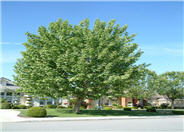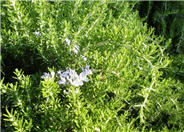
Common name:California Sycamore
Botanical name:Platanus racemosa
The California Sycamore is a fast growing deciduous tree that reaches up to 40'-50' high. It tolerates heat, smog, as well as moist conditions; it is native to riparian areas. It can be drought tolerant once it's established if there is a high water table. It has interesting mottled bark when the tree is bare in winter. Leaves in fall are gold, red and orange, creating litter. It is beautiful all year round.

Common name:Rosemary
Botanical name:Rosmarinus officinalis
Rosemary is hardy in full sun areas where winter temperatures do not drop below 10 degrees F. They can be grown in a clay pot with well-drained, porous soil in bright indoor light, and will also flourish on the backporch in spring, summer and fall. Its beautiful, slowly trailing stems and shiny slender leaves are perfect for showing off the small, light blue flowers that blossom in the summer. -Holland WIldflower Farm

Common name:Santa Barbara Daisy, Mexican Daisy
Botanical name:Erigeron karvinskianus
This low mounding perennial, with fine leaves and white to pinkish, daisy-like flowers, is an excellent asset to rock gardens.

Common name:California Sycamore
Botanical name:Platanus racemosa
The California Sycamore is a fast growing deciduous tree that reaches up to 40'-50' high. It tolerates heat, smog, as well as moist conditions; it is native to riparian areas. It can be drought tolerant once it's established if there is a high water table. It has interesting mottled bark when the tree is bare in winter. Leaves in fall are gold, red and orange, creating litter. It is beautiful all year round.
| Designer: Anon | Curb Appeal in Downtown Newhall |
Photographer: GardenSoft |
Soils and Compost:
Physical weed control, including mulching, or hand removal protects the watershed from harmful chemicals.
Water Saving Tip:
Check your irrigation controller once a month, and adjust as necessary.
Most plants require only one-third as much water in winter as they do in summer.
Integrated Pest Management:
Remove irrigation water and fertilizer from areas where you don't want weeds to grow.

